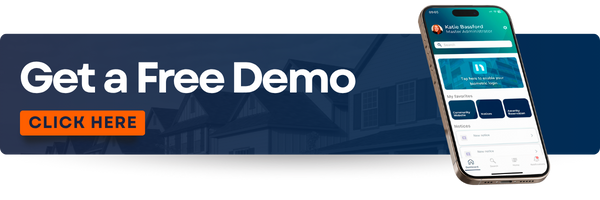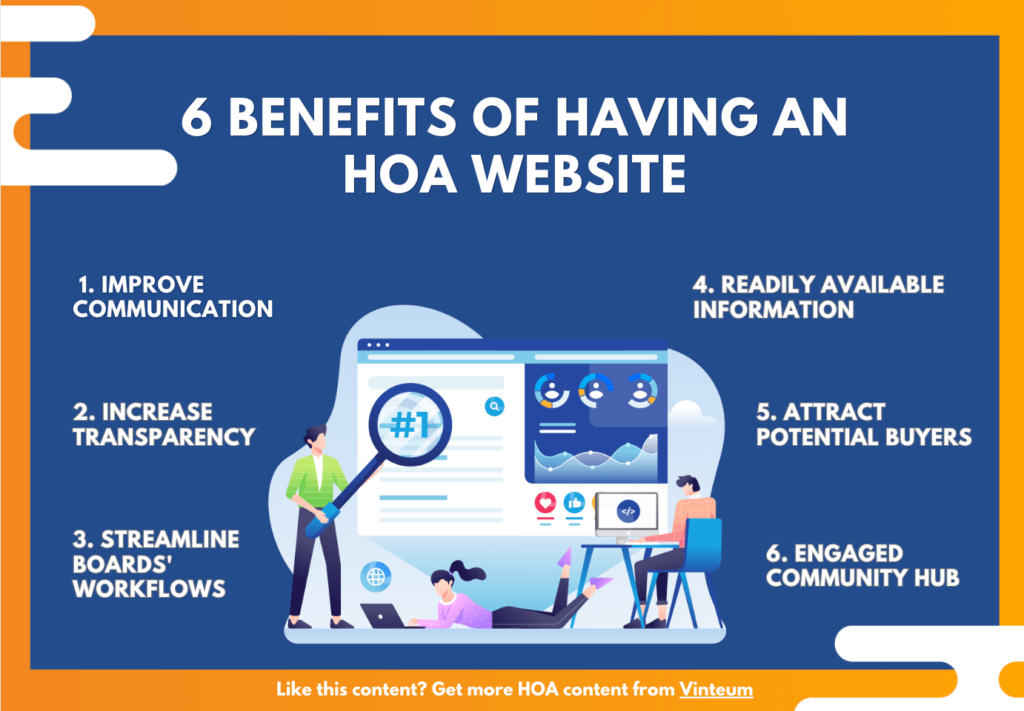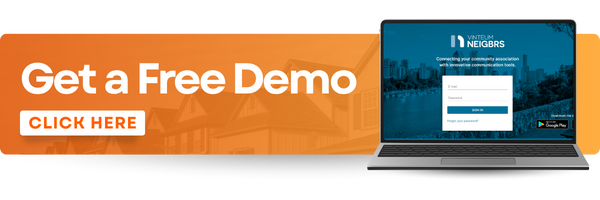
The recent Florida HOA website law, known as HB 1023, mandates that associations with 100 or more parcels must maintain specific records accessible via their association website or a mobile app starting January 1, 2026. If your association doesn’t have a website, it is essential to act now to stay compliant and avoid legal troubles. In this blog post, we will outline the steps you need to take to meet the requirements and discuss the benefits of having a website, along with practical advice for setting one up.
Table of Content
- HB 1203 — Homeowners’ Associations
- Requirements to be compliant
- Why was this law passed?
- Is my HOA compliant with the new Florida HOA website law?
- What if the Florida HOA Website Law doesn’t apply to me?
- Let’s clarify: Is an HOA Website the same as an HOA Portal?
- 6 Benefits of having an HOA website
- Finding the Right Provider for Your Website
- How Neigbrs by Vinteum can help you stay compliant with the law
HB 1203 — Homeowners’ Associations
Official Records
The bill requires homeowners’ associations to:
- January 1, 2026, associations with 100 or more parcels, maintain a digital copy of specified official records for download on the association’s website or through an application on a mobile device.
- Provide a copy of records or otherwise make the records available that are subpoenaed by a law enforcement agency within five days of receiving a subpoena.
- Maintain official records for at least seven years, unless the governing documents of the association require a longer period of time.
You can find further information on the website of the Florida Senate.
Requirements to be compliant
According to the Florida HOA Website Law (HB 1023), associations with over 100 units must post specific records on their website or a mobile app. Additionally, compliance requires a secured section on the website, accessible only through a password-protected portal to prevent unauthorized access. Adhering to these requirements is essential to meet the standards set by the law.
The specific records that must be posted to maintain compliance include:
- a. The articles of incorporation of the association and each amendment thereto.
- b. The recorded bylaws of the association and each amendment thereto.
- c. The declaration of covenants and a copy of each amendment thereto.
- d. The current rules of the association.
- e. A list of all current executory contracts or documents to which the association is a party or under which the association or the parcel owners have an obligation or responsibility and, after bidding for the related materials,equipment, or services has closed, a list of bids received by the association within the past year.
- f. The annual budget required by subsection (6) and any proposed budget to be considered at the annual meeting.
- g. The financial report required by subsection (7) and any monthly income or expense statement to be considered at a meeting.
- h. The association’s current insurance policies.
- i. The certification of each director as required by s.720.3033(1)(a).
- j. All contracts or transactions between the association and any director, officer, corporation, firm, or association that is not an affiliated homeowners’ association or any other entity in which a director of an association is also a director or an officer and has a financial interest.
- k. Any contract or document regarding a conflict of interest or possible conflict of interest as provided in ss.468.436(2)(b)6. and 720.3033(2).
- l. Notice of any scheduled meeting of members and the agenda for the meeting, as required by s. 720.306, at least 14 days before such meeting. The notice must be posted in plain view on the homepage of the website or application, or on a separate subpage of the website or application labeled “Notices” which is conspicuously visible and linked from the homepage. The association shall also post on its website or application any document to be considered and voted on by the members during the meeting or any document listed on the meeting agenda at least 7 days before the meeting at which such document or information within the document will be considered.
- m. Notice of any board meeting, the agenda, and any other document required for such meeting as required by subsection (3), which must be posted on the website or application no later than the date required for notice under subsection (3). The association’s website or application must be accessible through the Internet and must contain a subpage, web portal, or other protected electronic location that is inaccessible to the general public and accessible only to parcel owners and employees of the association.
Why was this law passed?
Florida tends to lead the way in setting standards for community associations nationwide. With 48,500 associations in 2019, it’s second only to California, which has 49,200. The significant growth in Condominiums and HOAs over the past forty years prompted Florida to establish new rules and regulations, ensuring a healthy environment for these communities.
As an example, condo associations in Florida already have a law in place regarding websites. Since 2019, condo associations with over 150 units have been required to have a website. Now, starting in 2026, this requirement will extend to associations with just 25 units.
Having a website improves communication and transparency within community associations. It also fosters accountability among board members and managers and helps members find important information easily.
Ensuring compliance with Florida’s evolving HOA regulations can be challenging, but Neigbrs makes it simple. Our all-in-one HOA management software includes a free website, helping your association stay compliant while improving communication, transparency, and accessibility.

Is my HOA compliant with the new Florida HOA website law?
If your association already has a website open to the public, it is worth checking if it meets the necessary standards. You should ensure your website is easily searchable on Google and that there is a section reserved for residents with password protection. It is also important to have the required documents uploaded there.
If you are unsure about compliance with the law, consulting your attorney is a good idea. Remember, failing to comply with the law could lead to fines, and homeowners have the option to report non-compliant associations.
What if the Florida HOA Website Law doesn’t apply to me?
The law could be revised to expand its coverage, similar to what happened with the Florida Condo Website Law (HB 1021). Initially, it required condo associations with over 150 units to have a website, but this threshold has since been lowered to 25 units. It is advisable to have a website, even if it is quite simple .A website helps communicate with residents and attract potential ones. It also makes board operations smoother, saving time and money.
Let’s clarify: Is an HOA Website the same as an HOA Portal?
It is important to understand the distinction between a public website and a members-only portal. A public website is easily found through Google searches, accessible to anyone worldwide. Therefore, it is crucial to be cautious about the information you share there and avoid posting sensitive details.
On the other hand, there is the members-only space, which could be a password-protected section of your website or a completely separate portal. Neigbrs by Vinteum, for instance, offers a portal accessible from your public website. This means the general public can access your public site, but only residents with a password can log in through the website. This keeps everything in one place. With a password-protected portal, you can benefit from extra features and functionalities, such as managing violations and amenity bookings more efficiently. However, if your main concern is sharing specific documents exclusively with members, a password-protected section on your website should suffice.
6 Benefits of having an HOA website
In today’s digital era, having an HOA website offers invaluable benefits for streamlined community management. Here are six key advantages:

- Improve Communication: A website acts as a central hub for clear and effective communication within the community.
- Increase Transparency: By making important information easily accessible, transparency is improved, fostering trust among residents.
- Streamline Boards’ Workflows: Simplify board operations and administrative tasks with efficient digital workflows facilitated by the website.
- Accessibility: Residents can easily access necessary information anytime, anywhere, ensuring convenience for all.
- Attractiveness to Buyers: A professional online presence can attract potential buyers, highlighting the appeal of the community.
- Engaged Community Hub: The website serves as a platform for community engagement, promoting a sense of belonging and participation among residents.
Finding the Right Provider for Your Website
When it comes to ensuring compliance with the Florida HOA Website Law, finding the right provider for your website is essential.
However, we understand that this can often represent an additional cost, especially at a time when Florida’s community associations are already grappling with inflation and other high expenses. Here are some tips for finding a good provider:
- Research: Take the time to research different website providers and compare their offerings. There are many website providers available. We recommend choosing one specialized in HOAs to ensure they understand and meet your requirements.
- Ask for Recommendations: Reach out to other HOAs in your area or industry contacts for recommendations. Hearing about others’ experiences can help you make an informed decision. You can also ask your prospective provider to send you some client case studies or client contact information so you can reach out to them.
- Check Reviews: Look for reviews or testimonials from past clients to gauge the provider’s reliability and quality of service. You can easily do so on platforms such as Capterra or Sourceforge.
- Consider Costs: While cost is an important factor, it’s also essential to consider the value you are getting for your investment. Look for providers that offer transparent pricing and competitive rates.
- Evaluate Support: Consider the level of customer support offered by the provider. You will want a provider that offers ongoing support to help you navigate any issues. Having support is essential, especially in the beginning when setting up the site and uploading the documents.
How Neigbrs by Vinteum can help you stay compliant with the law
Neigbrs by Vinteum provides easy-to-use, modern, and Florida-compliant HOA websites and portals.
Upon signing up, we take care of the heavy lifting for you. We set up your website, add your documents, and invite your residents. Our dedicated customer success team then guides you through using our platform effectively. Our team hosts frequent training sessions and is available via chat, phone, and email every business day to assist you with any questions you may have. With six unique website templates available, your website can reflect your community’s unique style.
Book a free demo today to find out how we can help you improve your communication with a website and portal.




